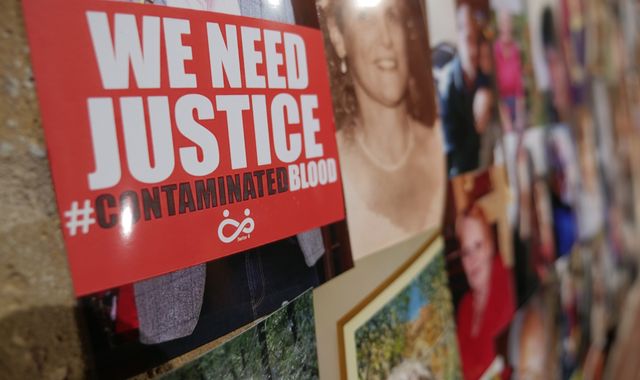Blood service collected donations from UK prisons despite infection risk warnings, documents to inquiry show
9 May 2024, 21:47 | Updated: 10 May 2024, 03:22

Documents submitted to the Infected Blood Inquiry reveal the blood service in the UK was taking donations from British prisons up until the late 1980s, despite warnings to end the practice.
It is evidence of how unsafe, by today's standards, the UK blood supply was until the early 1990s when testing for life-threatening viruses like hepatitis C and HIV became available.
Much of the inquiry has focused on haemophiliacs, the group harmed most in the infection scandal due to blood products imported from the US made from contaminated blood from paying donors including those in jail.
But the vast majority of people infected with hepatitis C in the UK acquired their infection via blood transfusions in the NHS for things like routine surgery, cancer treatment or following childbirth.
Blood given to this silent majority in the infected blood scandal was sourced almost exclusively from donors in Britain.
"I felt so guilty I passed it on," says Daphne Whitehorn.
Read more:
Infected blood compensation 'to be extended' to bereaved children
Victims and victims' families lobby Westminster for compensation
She contracted hepatitis C from a blood transfusion she received during a kidney transplant in 1971.
"But I didn't know I could pass it on because I was never told anything about it," she says.
Her daughter Janice tested positive for the virus in 2019, probably infected when she was born. Neither knew they had the infection for decades.
Symptoms can be mild at first, many people naturally clear the virus and treatments introduced in the last decade can cure most people of their infection without serious side-effects.
But chronic infection can cause severe liver damage, liver failure and liver cancer.
The Whitehorns and thousands of other victims of the scandal are looking to the Infected Blood Inquiry for answers.
Key among them, why so many people were infected with hepatitis C.
There are no precise numbers, many of the records of donors, recipients and procedures have been lost or destroyed.
But statistical experts for the inquiry estimate around 27,000 people may have been infected with hepatitis C via transfusions. Most have subsequently died of other causes but they calculate around 1,600 have died so far from causes related directly to their hepatitis C infection.
The inquiry has heard how more could have been done to keep viruses like hepatitis out of the blood supply.
Documents show how calls to end the practice of taking donations from the prison population were slow to be heeded.
The inquiry was shown evidence that in 1973 rates of hepatitis viruses were found to be fives times higher in prisoners than the general population.
While this led to many regional blood services to stop taking donations from prisons, others continued. The last prison donation took place in 1987.
But the inquiry is expected to consider far wider failings too.
Like why, when testing for HIV for and then Hepatitis C became available, was the blood service slow to adopt using them. Also why infected frozen stocks of blood taken before Hepatitis C testing was introduced were not retrospectively tested before being given to patients in the early 1990s.
In addition, victims of the scandal want to know why it took four years for the Department of Health to approve a "look-back" exercise to identify those who may have been infected due to a blood transfusion. Also why that exercise left so many still unaware they had been infected.
"We're very sorry for the parts that we played in the past," says Dr Gail Miflin, chief medical officer of the NHS Blood and Transplant Service.
"Listening to the stories of those infected and affected, they are dreadful stories.
"My job as chief medical officer is to ensure that the blood supply today is safe and that people who need a transfusion today, get blood that comes from one of the safest blood services in the world."
And much has changed.
Donors today are screened for lifestyle factors and travel history that might have put them at risk of blood-borne infections.
Each donation is also tested for a number of infections including HIV and hepatitis C, and a sample of each donation is archived for three years in case re-testing is required.
The Infected Blood Inquiry is due to publish its final report on 20 May.
If you think you may have been at risk of hepatitis C infection, free testing is available in England: https://hepctest.nhs.uk/ in Wales: https://www.shwales.online/wales-sti-testing-kit-test-and-post.html In Scotland you will need to speak to your GP.
(c) Sky News 2024: Blood service collected donations from UK prisons despite infection risk warnings, documents to inquiry show







